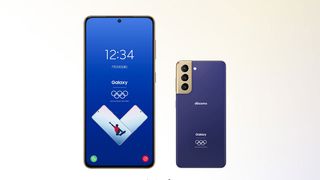Samsung Galaxy S21 Olympic Games Edition is here - but you probably can't buy it
Sporting a blue design

Months after the Samsung Galaxy S21 launched, Samsung is unveiling a new version of it called the Olympic Games Edition, meant to tie into the quadrennial sports event starting on July 23.
Unveiled by Japanese telecommunications company NTT Docomo, this new version of the base handset is likely exclusive to Japan - we say that because Docomo has a history of exclusive versions of Samsung phones.
Take, for example, the ill-fated Samsung Galaxy S20 Plus Olympic Edition, which was again exclusive to Japan - Samsung probably didn't bank on the 2020 sporting event being postponed to 2021, but at least the postponement gave the company an opportunity to make a second Olympic phone.
- Check out our Samsung Galaxy S21 Ultra review
- The Galaxy Note 21 could be on its way
- As could Amazon's Prime Day 2021
What's new with this phone?
The Samsung Galaxy S21 Olympic Games Edition is blue. That's literally the only difference from the standard three-camera, 6.2-inch screen, Qualcomm Snapdragon 888 phone.
The S20 Plus' Olympic version was a slab of bright and garish gold, like the #1 medal - we're not aware of a blue medal, but maybe that's what they give the fourth-place contestant for each sport.
The phone also has the five-ring Olympic Game logo, the word 'Galaxy' (Samsung phones are marketed solely under that name in Japan) and NTT Docomo's logo.
If you really love the look of this Samsung Galaxy S21 Olympic Games Edition, you may be able to import it. Given the appearance isn't all that different to the Phantom Violet shade of the standard device, it'd be much easier just to stick to that.
Get daily insight, inspiration and deals in your inbox
Get the hottest deals available in your inbox plus news, reviews, opinion, analysis and more from the TechRadar team.

Tom Bedford was deputy phones editor on TechRadar until late 2022, having worked his way up from staff writer. Though he specialized in phones and tablets, he also took on other tech like electric scooters, smartwatches, fitness, mobile gaming and more. He is based in London, UK and now works for the entertainment site What To Watch.
He graduated in American Literature and Creative Writing from the University of East Anglia. Prior to working on TechRadar, he freelanced in tech, gaming and entertainment, and also spent many years working as a mixologist. He also currently works in film as a screenwriter, director and producer.
